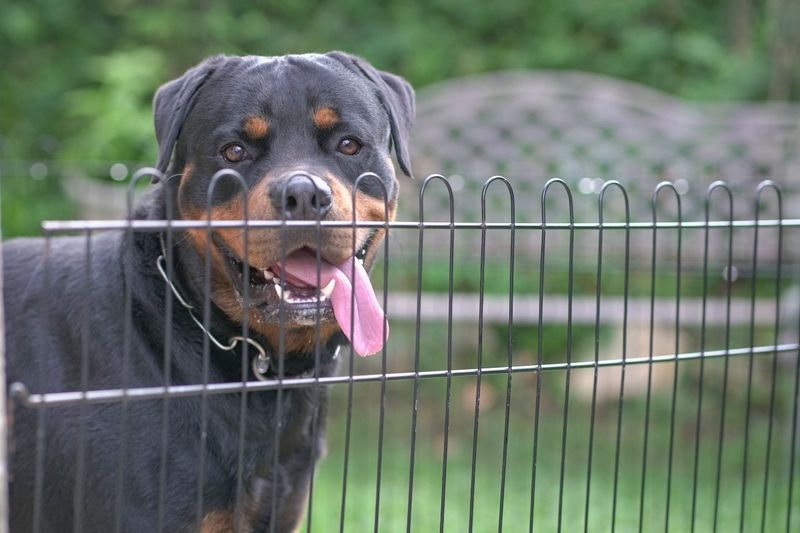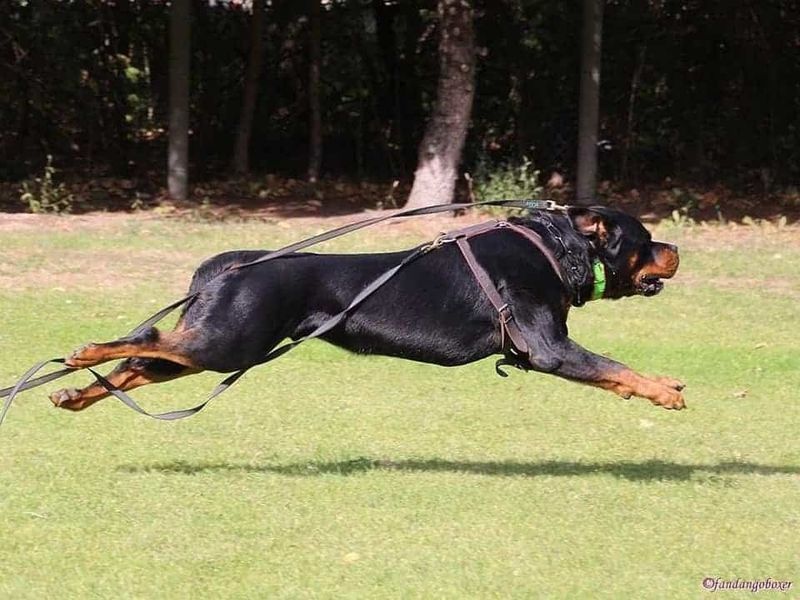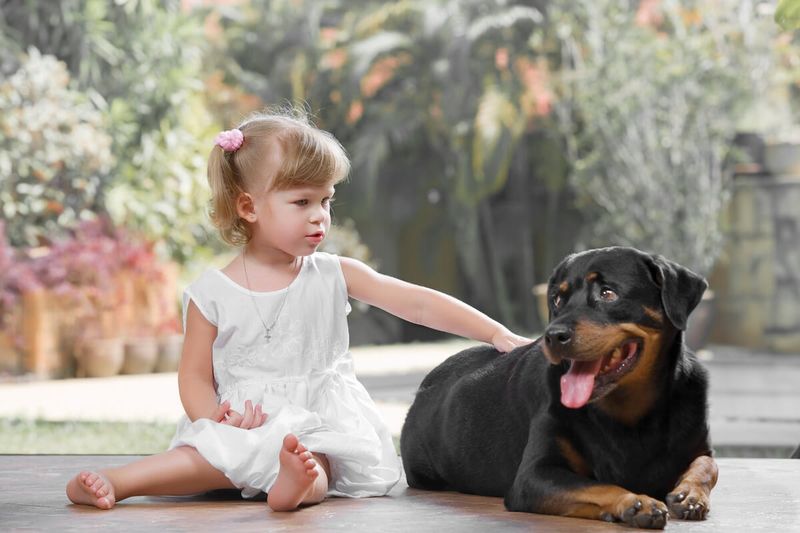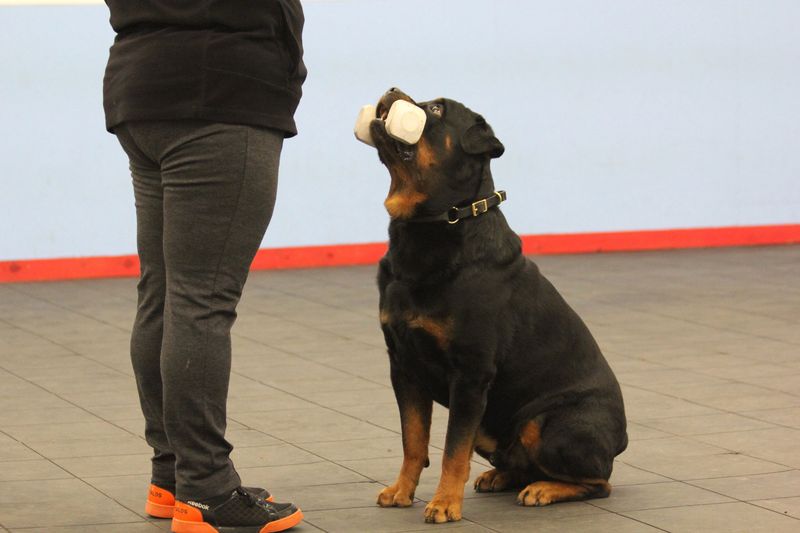7 Pros and 7 Cons of Owning a Rottweiler
Few dog breeds spark as much admiration—and debate—as the Rottweiler. With their muscular build, commanding presence, and deep-set eyes, these dogs are impossible to ignore.
Some people see them as loyal guardians and gentle giants, while others are wary of their reputation for aggression. The truth? Rottweilers are complex, multifaceted dogs.
They’re not for everyone, but for the right owner, they can be an incredibly rewarding companion. Understanding both the good and the not-so-good sides of this breed is essential before bringing one into your home.
This breed has roots that go back to ancient Rome, where they were used as herding and guard dogs.
That same working drive and fierce loyalty still exist today, but it now comes packaged with modern expectations—like obedience, adaptability, and sociability.
Rottweilers aren’t just brawny watchdogs; they’re also affectionate family members when properly trained and loved. But here’s the deal: they need structure. A bored or untrained Rottweiler can be a handful—sometimes literally.
Their strength is no joke, and without clear boundaries and consistent training, they can run the show. It’s why some first-time dog owners may find themselves overwhelmed.
On the flip side, their devotion is unmatched. Rottweilers often form intense bonds with their people and will go above and beyond to protect them.
Whether curled up at your feet or alertly patrolling the yard, they’re always tuned into your presence.
So if you’re considering adding a Rottweiler to your family—or just curious about what life with one might look like—this guide is for you. We’ll walk you through the biggest perks and potential challenges of Rottweiler ownership.
1. Loyal and Protective
No need to guess where your Rottweiler’s loyalty lies—they’re fiercely committed to their family.
These dogs naturally adopt the role of protector, keeping an eye on everything from strangers to squirrels on the lawn. It’s not about aggression—it’s about vigilance.
They’re happiest when close to their people, often shadowing them from room to room.
In moments of uncertainty or danger, they spring into action without hesitation. Their devotion isn’t loud or showy; it’s steady, dependable, and always present.
This kind of loyalty creates deep emotional bonds.
You’ll know you’re safe—and that someone always has your back.
2. Intelligent and Trainable
Training a Rottweiler is less about teaching and more about tapping into their natural smarts. They grasp new commands quickly and enjoy having tasks to focus on.
Obedience, agility, tracking—these dogs excel when given structure and clear direction.
But don’t let their brains go to waste. Without mental stimulation, boredom creeps in, and with boredom comes mischief.
Consistency is key.
They respond best to firm, fair guidance and positive reinforcement. Give them leadership and they’ll gladly follow.
And when training clicks with a Rottweiler?
You end up with a confident, well-mannered powerhouse that makes you proud every day.
3. Great Guard Dogs
You don’t need a high-tech alarm system when a Rottweiler lives under your roof. Their instincts naturally lean toward protection, and they’re incredibly aware of their surroundings.
They don’t bark needlessly, but when they do—it’s with reason.
A deep, thunderous bark paired with a solid stance sends a clear message to potential intruders.
What makes them ideal guards is their discernment.
They won’t overreact but will always assess a situation carefully.
Add in their physical presence and intimidating look?
You’ve got one of the best natural deterrents you could ask for—wrapped in loyalty and muscle.
4. Versatile Working Dogs
There’s more to this breed than meets the eye. Rottweilers have long held roles beyond family pets, from herders and cart-pullers to police and service animals.
They thrive when given jobs to do.
Whether it’s assisting with mobility, tracking scents, or simply learning tricks, they love a challenge.
Working roles help them stay balanced mentally and physically.
A Rottie without a purpose can feel lost or restless.
If you’re someone who likes engaging your dog with tasks or advanced training, this breed fits the bill.
Give them direction, and they’ll give you dedication in return.
5. Low Grooming Needs
Their sleek black-and-tan coat doesn’t demand much maintenance. Weekly brushing is usually enough to control shedding and keep their coat shiny.
Rottweilers aren’t high-maintenance in the grooming department.
They don’t mat easily, rarely need haircuts, and generally have minimal odor.
Baths can be spaced out unless they’ve rolled in something unfortunate.
A wipe-down and ear cleaning here and there is plenty.
This makes them an appealing option for people who want a clean, low-effort companion.
They stay handsome with little fuss—and still manage to look regal doing it.
6. Athletic and Energetic
These dogs don’t just sit around—they’re built to move. Rottweilers thrive on activity, and regular exercise is a must for their well-being.
Whether it’s brisk walks, hiking trails, or structured playtime, they’re ready to join you.
That stamina and strength were bred for working, after all.
Without physical outlets, they can become restless or destructive.
But tire them out? You get a calm, happy companion.
They’re ideal for active families or owners who love spending time outdoors.
Think of them as workout buddies with four legs and an unstoppable motor.
7. Excellent Family Dogs (When Trained)
With proper socialization and clear boundaries, Rottweilers can be incredibly affectionate and gentle at home. They often form close bonds with children and enjoy being part of family life.
That said, their size and strength require mindful interactions, especially with small kids.
But don’t be surprised if they become the family’s quiet protector.
They’re not the type to demand attention constantly, but they’ll always be close by.
Loyal, observant, and surprisingly cuddly, they often steal hearts once trust is earned.
When raised right, they’re not just family-friendly—they’re family-focused.
And they’ll stay that way for life.
8. Needs Firm Training and Leadership
Confidence without direction can spell trouble with this breed. Rottweilers need someone who’s consistent, calm, and assertive—not harsh, but steady and clear.
Without guidance, they may test boundaries or become too dominant.
That’s not aggression—it’s a lack of structure.
Early training and regular reinforcement make all the difference.
They respect leaders who earn it, not demand it.
If you’re unsure of how to establish rules, professional training is a wise investment.
The payoff? A respectful, responsive companion who knows their place—and loves it.
9. Requires Early Socialization
A puppy’s experiences shape their behavior for life, and that’s especially true for Rottweilers. Exposure to different people, pets, and environments helps them develop confidence and adaptability.
Without it, they may grow overly suspicious or reactive.
A Rottweiler who isn’t socialized can struggle with anxiety or aggression.
Safe, positive interactions from a young age are essential.
Group classes, park visits, and varied outings make a big difference.
The earlier this foundation is built, the more balanced your dog will be.
It’s the key to unlocking their gentle, protective side safely.
10. Size and Strength Can Be Intimidating
Even a friendly Rottweiler can unintentionally scare people. Their size, muscle, and serious expression often lead to misunderstandings—especially among strangers.
These dogs are strong, and if untrained, that strength becomes hard to manage.
They can easily pull on a leash or knock someone over.
It’s important to teach them manners early and reinforce them often.
This isn’t a lap dog—it’s a living tank with a tender heart.
With proper control, they’re gentle giants.
Without it, they can become a safety risk—even without meaning to.
11. Banned or Restricted in Some Areas
Breed-specific legislation is an unfortunate reality for Rottweiler owners. Some cities, apartment complexes, or insurance providers have rules that ban or limit this breed.
Even well-behaved dogs can be affected.
Laws don’t always distinguish between aggression and reputation.
Before adopting, check local regulations and housing policies.
It could save you major headaches—or heartbreak.
Advocacy is changing perceptions slowly, but restrictions remain.
Being aware of them helps you make informed, responsible decisions.
12. Health Concerns
No breed is immune to health problems, and Rottweilers are no exception. Common issues include hip and elbow dysplasia, heart disease, and certain cancers.
Routine vet visits and early screenings are important.
Large breeds like this often have shorter lifespans, too—around 8 to 10 years.
Nutrition, exercise, and genetics all play a role in longevity.
Be prepared for potential vet bills and emotional tolls.
Choosing a reputable breeder who tests for hereditary issues is crucial.
It’s a big commitment, but one that can lead to a longer, healthier life for your dog.
13. Can Be Stubborn
Sometimes, a Rottweiler will look you dead in the eye and do the opposite of what you asked. That’s not defiance—it’s independence wrapped in muscle.
They like to think things through on their own terms.
While that trait makes them clever, it also makes them a bit hard-headed.
Patience and creativity go a long way in training.
Repetition and rewards help drive home the message.
You’ll need to stay consistent without losing your cool.
When they respect you, though, they’re eager to please—on their own schedule.
14. Not Ideal for First-Time Dog Owners
Jumping into dog ownership with a Rottweiler can be overwhelming. These dogs require confidence, experience, and a serious commitment to training and socialization.
They’re not plug-and-play pets.
The learning curve can be steep, especially for someone unfamiliar with strong, protective breeds.
First-timers might struggle with behavior challenges or misread warning signs.
That’s where mentorship, classes, and professional guidance come in.
Experienced owners often find Rottweilers incredibly rewarding.
But for beginners, another breed might be a better match—at least for now.


















